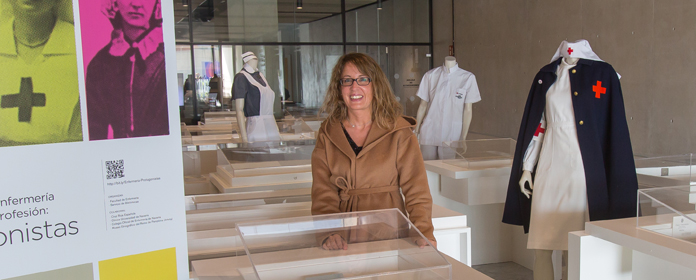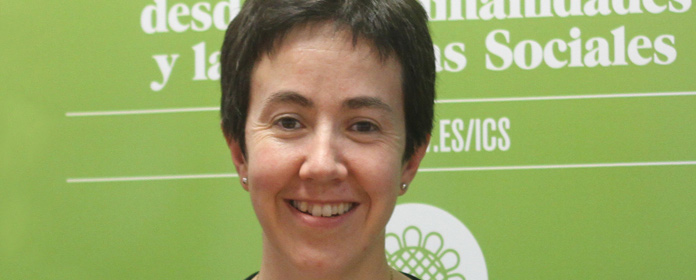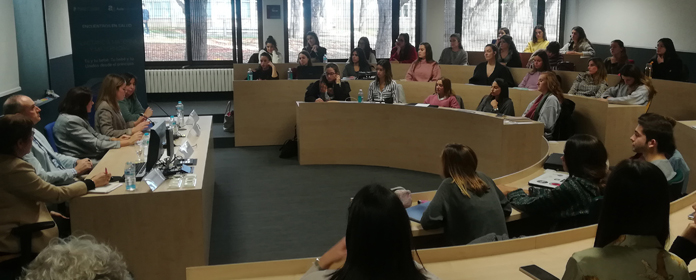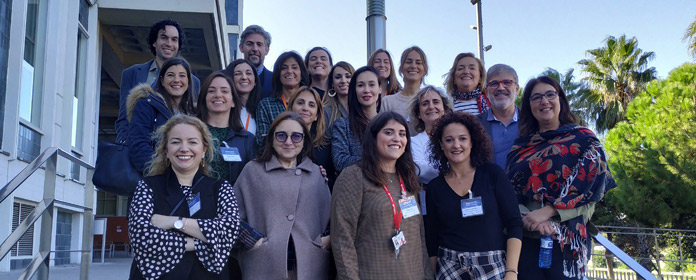Writing to heal and to help to heal
Ana López Recalde, a 3rd year nursing student, suffered from anorexia nervosa for 4 years. "Princesas de cristal", a book written with her father and her doctor, narrates her struggle: a therapeutic story that seeks to give hope to those who suffer from the same disease.
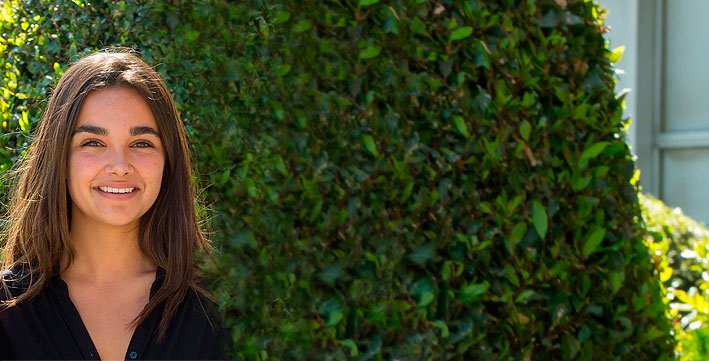
Ana López Recalde is a 3rd year nursing student. At the age of 14, she began to suffer from anorexia nervosa. "It coincided with the madness of adolescence. You start to consider everything, you don't want anyone to tell you how to do things. You want to be your own guide and the sole owner of your life," he recalls.
Ana struggled with the disease for 4 years, during which she sank into deep despair as she found no meaning to her suffering. But she was not alone. The book "Princesas de cristal" is the test. In it, Ana tells her experience, her fights, her lies, her admissions, her recovery... And her father, Ignacio López-Goñi, professor at the School of Sciences; and her doctor, Azucena Díez, specialist in Pediatrics and Psychiatry at the University of Madrid, write alongside her. Clínica Universidad de Navarra.
"Princesas de cristal" is a narrative written by three hands. But it is, above all, a healing story. "Writing this book was a point core topic at the time of my recovery. Itserved as therapy, not only for me, but also for my parents and the doctor," she explains. "Also, we felt that sharing our story and suffering could be a support for other people," she adds. "We just hope they find some hope and don't give up."
- What has writing this book meant to you?
It has allowed me to open wide to the medical team and my family. It allowed me to get to know myself more deeply and to know. I was able to capture my thoughts, burdens, sensations, feelings, lies, purges and get something wonderful out of it all.
Also, I got to know more closely the pain of my parents; it opened my eyes and my mind. I could appreciate their unconditional love and all the suffering they had been carrying for years.
And, of course, it allowed me to understand much more about the disease, the reason for the treatment and the reality that I was not able to see because of my distortion. All this, thanks to Azucena, the doctor who took care of my family and me until the end. The doctor who suffered with us those 4 years of despair and helped us to get out of that pit.
- What prompted you to write it?
For a long time I tried to make sense of the disease.
In spite of having been raised in a Christian family, where God had always been and still is very present; in spite of having been taught at home and at high school that God is love and mercy, that He can do everything...; the illness made all that no longer make sense in my life. Why did God allow me to suffer from a mental illness? Why was this happening to me, to my parents, to my friends...? I felt that the whole world was against me and that everything I had learned since I was a child was a lie.
Little by little I understood that sharing my suffering and that of my family could be a form of shelter and support for other people in the same situation status. To this reflection was added the need I felt to finally free myself from all the lies, deceptions,... that continued to torture me as a result of the disease. Through writing I found a form of therapy that allowed both my family and the medical team to understand what was going on in my head.
 |
| Ana with her father, Ignacio López-Goñi, and her doctor, Azucena Díez, at the presentation of the book at the Cima University of Navarra. |
- What did you find most difficult to do?
Undoubtedly, what was hardest for me was to confess my cheating, deception or lies. When we decided to start writing I was still suffering from the disease and on many occasions I felt like a hypocrite myself. I was trying to encourage optimism and hope to other girls while I myself was still vomiting or ravaging boxes and boxes of laxatives. For months I stopped writing, unable to confess it and fearing the reaction of my parents and doctors. However, putting it in writing, "letting go of the toad", assuming it was just another part of the disease, opening up and fully trusting the medical team and my parents helped me in my recovery.
It was also hard to remember that recovery when it came time to recount it in the book, especially the income. The first one was devastating. But, without a doubt, it was tremendously fruitful. It was there that we took the first steps towards healing and it was where I met "my nurses".
 |
| Book cover. |
- How do you think telling your story can help others?
We all suffer in this life. But, many times it is complicated to ask for financial aid because of fear, shame, because we believe that we will not be understood... Avoiding or hiding the pain only makes it bigger. That is why I believe that shared suffering is "less suffering". Why should you carry the backpack of stones alone, why not ask for financial aid?
We thought that sharing our story and suffering in an open way could be a support for all those parents, siblings, friends, "crystal princesses"..., who suffer in silence. We hope that with this book you can find some hope and that you will not give up.
- From your experience, what steps do you think still need to be taken to raise awareness in society, prevent this subject of diseases and treat them correctly?
Unfortunately, I think there is still a long way to go work . At the societal level there are many stereotypes and prejudices about mental illness.
issue Many of the models proposed by fashion, express diets and some pharmaceutical products contribute to the increasing number of people suffering from this disorder subject .
I believe that if from an early age at home and in schools, if the emphasis were placed on promoting self-esteem based on personal values rather than on the thickness of your lips or the length of your eyelashes, the world would be a better place. They should teach us from childhood to know how to criticize this content subject , to be satisfied with our imperfections and not to attribute them to something bad or a lack.
I also think that content in social networks and media should be more thoroughly regulated and that the major political powers should be made aware of their responsibility.
- At this point, do you feel that nurses play (or can play) a special role?
Undoubtedly, our work is extremely important. I believe that every nurse and staff should know how to detect with subtlety and efficiency this subject of disorders. From Pediatrics, Primary Care... how much good can be done!
It is very important to know how to refer in time, if necessary, to Psychiatry. Put aside any fear or prejudice and focus on our work; caring and watching over our patients.
It is also of vital importance the work team with other related specialties, whether Nutrition, Endocrinology, Gynecology ... Communication, active listening and a good care plan are the basis for effective treatment.
We nurses are the common thread of treatment. We need the physicians and they need us. Our work is synergistic. Hence the importance of knowing how far I can go, what my competencies are as a nurse and, most important of all, the well-being of our patient.
- Did your illness influence in any way your decision to study nursing?
Of course. I had never considered studying this before degree program. It was only after the admission that I was able to see what a nurse's job is all about. I found it impressive.
I had never thought how you could fit so much in a profession where every day you are in contact with the suffering, with the most human side of people. It is priceless. To be able to be light and support for them in their most vulnerable moments, without a doubt, is the greatest reward.
There is conference of hard practices: you feel useless, you end up exhausted, your patients do not improve, or they do, or they are alone; or they would prefer to be alone... It is hard, but tremendously satisfying when you know that no matter how small it is, you can contribute something to them.

